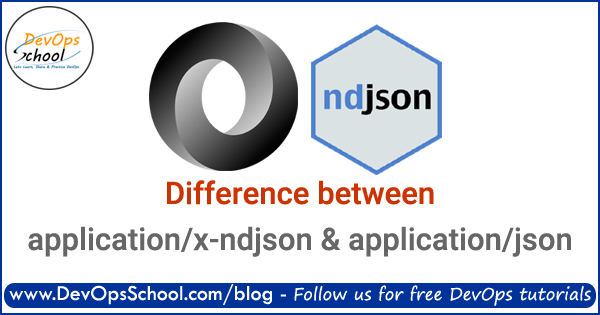
Lets understand what is json?
- JSON stands for JavaScript Object Notation
- JSON is a lightweight format for storing and transporting data
- JSON is often used when data is sent from a server to a web page
- JSON is “self-describing” and easy to understand
JSON Example
{
"employees":[
{"firstName":"John", "lastName":"Doe"},
{"firstName":"Anna", "lastName":"Smith"},
{"firstName":"Peter", "lastName":"Jones"}
]
}Code language: JavaScript (javascript)Now, Lets understand what is ndjson?
The ndjson format, also called Newline delimited JSON. NDJSON is a convenient format for storing or streaming structured data that may be processed one record at a time.
The bulk API makes it possible to perform many index/delete operations in a single API call. This can greatly increase the indexing speed.
The final line of data must end with a newline character \n. Each newline character may be preceded by a carriage return \r. When sending requests to this endpoint the Content-Type header should be set to application/x-ndjson
When calling the _bulk endpoint, the content type header should be application/x-ndjson and not application/json. NDJSON is a convenient format for storing or streaming structured data that may be processed one record at a time.
The reason it is not a JSON array is because when the coordinating node receives the bulk request, it can split it in several chunks simply by looking at how many lines (i.e. new line characters) there are and send each chunk to a different node for processing. If the content was JSON, the coordinating node would have to parse it all and for several megabyte bulk queries, it would have a negative impact on performance.
Example
curl -H “Content-Type: application/x-ndjson” -XPOST ‘localhost:9200/customers/personal/_bulk?pretty&refresh’ –data-binary @”customers_full.json”
I’m a DevOps/SRE/DevSecOps/Cloud Expert passionate about sharing knowledge and experiences. I am working at Cotocus. I blog tech insights at DevOps School, travel stories at Holiday Landmark, stock market tips at Stocks Mantra, health and fitness guidance at My Medic Plus, product reviews at I reviewed , and SEO strategies at Wizbrand.
Do you want to learn Quantum Computing?
Please find my social handles as below;
Rajesh Kumar Personal Website
Rajesh Kumar at YOUTUBE
Rajesh Kumar at INSTAGRAM
Rajesh Kumar at X
Rajesh Kumar at FACEBOOK
Rajesh Kumar at LINKEDIN
Rajesh Kumar at PINTEREST
Rajesh Kumar at QUORA
Rajesh Kumar at WIZBRAND


the best explanation of the topic